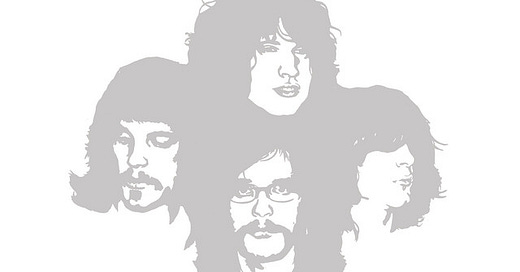Life goes by
Kings of Leon - 'Holy Roller Novocaine' / 'Talihina Sky' (Youth & Young Manhood - 2003)
I have only seen a Kingfisher twice—not the same one. I'm pretty sure of that, with a 15-year gap and a distance of about 70 miles. The most recent was about five years ago and isn’t relevant to where I’m going with this, but the first was when I was working on a summer job in Kent in the sweltering summer of 2003, and I remember seeing a dash of orange and iridescent blue darting before me before I could be sure of what it was. I’d been travelling on the train and listening to Kings of Leon’s Youth and Young Manhood on my CD Walkman. The album is slightly longer than the train journey, so I left it running on expecting that after ‘Holly Roller Novocaine' to reach the end and unlike now, where I could find a couple of songs to fill out the short walk, the effort of loading another CD in the street or restarting it didn’t occur to me.
I would love to say that the kingfisher darted past me at the exact point the hidden track ‘Talihina Sky’ kicked in as a double whammy of the unexpected, but that was not the case. I saw the kingfisher on a different day, but it was roughly the same place on the walk and a few days apart.

Brothers Caleb, Nathan, Jared Followill and their cousin Matthew Followill burst onto the music scene with their debut album, Youth and Young Manhood, in the summer of 2003. The album was eagerly anticipated that year. In the moments after, The White Stripes’ Elephant and Radiohead’s Hail To The Thief took up a lot of the Easter and Whitsun discourse in what was formally the inky weeklies.1 What lay ahead was the explosion of The Darkness and ‘Hey Ya’, but by early July, promising work such as Holly Roller Novocaine EP, which included the title track and other future singles like ‘California Waiting’ and ‘Molly’s Chambers’ was generating interest. This was especially true in the UK, where those early singles generated a significant buzz. Critics and fans alike were taken by their more raw, Southern rock sound, which stood out starkly against the more polished - yet still scruffy - mainstream music of the early 2000s from places like New York. Hyped acts releasing great chunks of their debut album before release is a gambit that Suede, The Strokes, Bloc Party and The Klaxons managed, and others closer today, such as Wet Leg and The Last Dinner Party, have shown a lot of their hand before the big release.
Girls lie too much. Boys act too tough. Enough is enough
I distinctly remember when I started to get excited about The Strokes’ debut album, Is This It. I was on holiday in Florida with my parents, and I recall sitting in the rental car on a hot day when the seat-belt tongue would be considered a weapon. This was August 2001, and I had recorded a mix of songs onto a MiniDisc to listen to on holiday, and one o…
The album's final listed track, ‘Holy Roller Novocaine’, in a form we had heard on the early single version, was still a showcase for that spit and sawdust ethos and epitomises the gritty, unpolished ethos of Kings of Leon’s early work - before the different world of billion plus streaming ‘Sex on Fire’. It has raucous energy and fiery vocals and potently displays the band's roots-rock and garage influences. It melds religious imagery with an implied warning about a man of the cloth. There's a rumour that the song is about a clergyman who misuses his authority to seduce and exploit vulnerable women, and there’s undoubtedly a double-entendre slipped in about halfway.2
However, the hidden track, ‘Talihina Sky’, continues to resonate with me after all these years. It offers a poignant contrast to the album’s predominantly energetic vibe. A piano-led and acoustic ballad, it is starkly more introspective and subdued. Named after Talihina, Oklahoma, where the Followill family would hold annual reunions, the song carries a sense of nostalgia and introspection that seems to transcend their ages at the recording time. It provided a reflective end to the album, painting a picture of returning to a simpler, albeit imperfect, place that resonates with the roots of their familial and musical heritage.
The placement of ‘Talihina Sky’ as a hidden track may suggest a desire to end the album on a note of return and reflection, a nod to the band's personal history and the quieter aspects of their identity that simmer beneath the more publicised rock persona that saw them met with considerable acclaim, particularly in the UK, where they were lauded as one of the freshest acts on the American rock scene. I remember seeing stickers slapped on the CD in shops that the NME had called “the best debut since Definitely Maybe” - a golden quote for any PR machine that needed one.
It wasn’t just British critics and PR outfits who were particularly receptive. Audiences were, too, and the band have frequently acknowledged the UK’s role in their early success, which built through more substantial chart positions for lead singles on each album. ‘Holy Roller Novocaine’ and ‘Talihina Sky’ do a solid job of collectively encapsulating a duality of Kings of Leon’s early image: one part raw, unrefined rock and roll showed off to the world, and one part a more subdued, introspective and almost folk in tone but kept at arm’s length.
But now included the monthly magazine Bang for a few short months.
Oh-er missus.






What an album! I much prefer the first three albums to the rest of their repetoire.
And the mention of a CD walkman brings back some memories from those pre-iPod/streaming days
Absolutely loved this debut. The soundtrack of my late teens. An album about sex, drugs and rock and roll delivered with speed, sexy riffs and wicked vocals. Loved. It. Love kingfishers too!